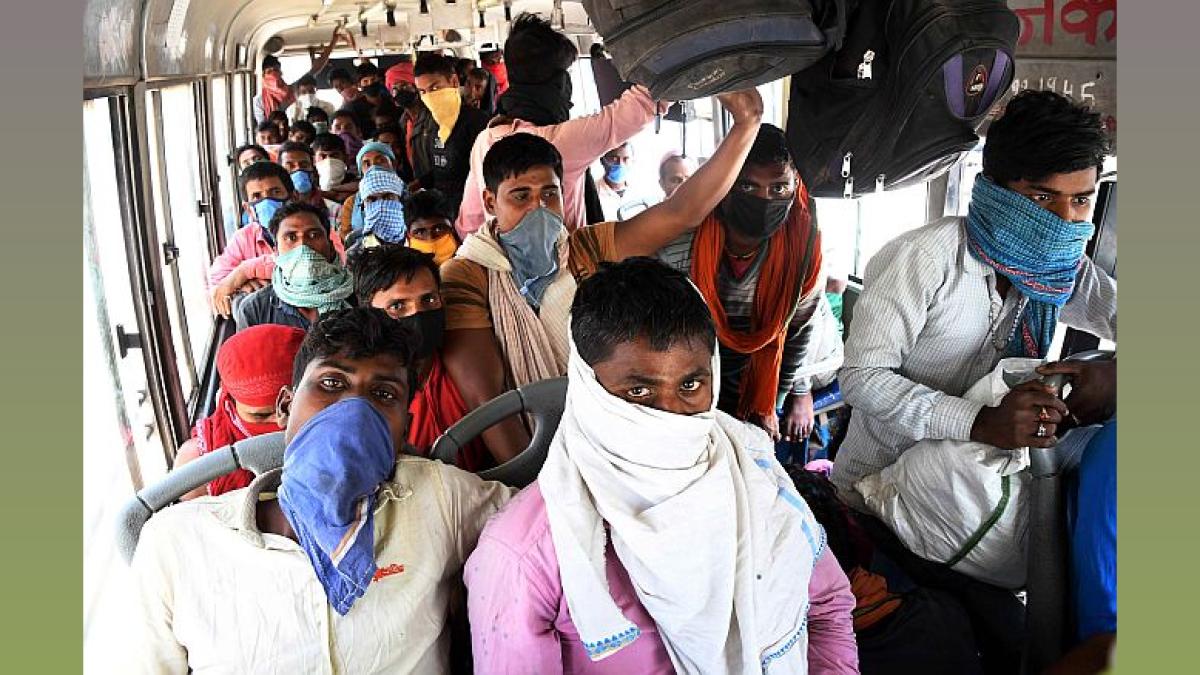NITI Aayog: Worker Housing Key to India's Manufacturing Growth
NITI Aayog proposes 'SAFE' accommodations near factories to attract workers, boost manufacturing and make India a global hub. Recommendations include tax breaks, zoning changes and government funding.

Photograph: Aftab Alam Siddiqui/ANI Photo
New Delhi, Dec 19 (PTI) Workers' accommodations near factory sites need to be classified as residential units for levying lower property tax, power and water tariffs so as to ensure better living standard, government think tank NITI Aayog said in a report on Thursday.
The lack of suitable accommodations restricts migration of workers, particularly women, thereby limiting the manufacturing sector's growth potential, NITI Aayog said in a report titled 'S.A.F.E (Site Adjacent Factory Employee) Accommodation - Worker Housing for manufacturing growth'.
"Designate S.A.F.E. accommodations as a distinct category of residential housing to ensure residential property tax, electricity, and water tariffs apply," it recommended.
The report also called for GST exemptions for accommodations meeting specified criteria (e.g., Rs 20,000 per person per month for a continuous stay of 90 days).
The report pitched for including S.A.F.E. accommodations under the exemptions provided for industrial sheds, schools, colleges, and hostels in the draft notification issued by the Ministry of Environment, Forest, and Climate Change (MoEF & CC).
It also called for encouraging the development of accommodations suitable for workers, addressing their specific safety and welfare needs.
The report further suggested amending zoning regulations to allow mixed-use developments near industrial hubs, facilitating worker housing close to workplaces.
To overcome financial barriers, the report pitched for providing up to 30 per cent-40 per cent of project costs (excluding land) through VGF (Viability Gap Funding).
"This includes 20 per cent from the Department of Economic Affairs (DEA) and 10 per cent from the sponsoring nodal ministry, with additional contributions from state governments," it said.
The report also emphasised on transparent bidding processes to determine VGF support, ensuring efficiency and cost-effectiveness.
It recommended leveraging VGF to upgrade brownfield worker accommodations, enhancing their safety, capacity, and utility.
The report highlights several challenges that hinder the development of worker accommodations, including restrictive zoning laws, high operating costs, and conservative building bye-laws, among others.
This comprehensive report explores the crucial role of secure, affordable, flexible, and efficient (S.A.F.E.) accommodations for industrial workers in boosting India's manufacturing sector.
It identifies key challenges, offers actionable solutions, and highlights the pivotal interventions required to scale up such housing facilities across the country.
In the Union Budget 2024-25, Finance Minister Nirmala Sitharaman had emphasized the importance of rental housing with dormitory-style accommodations for industrial workers.
This initiative, to be executed under a Public-Private Partnership (PPP) model with VGF support and commitments from anchor industries, underscores the government's commitment to addressing a critical component of India's manufacturing ecosystem.
The NITI Aayog in a statement said India is poised to elevate its manufacturing sector's contribution to GDP from the current 17 per cent to 25 per cent as part of its long-term vision of achieving Viksit Bharat by 2047.
This ambitious goal is aligned with the country's objectives of becoming a global manufacturing hub under flagship initiatives such as Make in India and Atmanirbhar Bharat, it added.
"Realizing this vision demands a robust workforce strategy, including sufficient, proximate, and affordable housing for industrial workers," the statement said.
Identifying several benefits of providing S.A.F.E. accommodations for industrial workers, the report said multinational corporations and global investors increasingly evaluate worker welfare and operational efficiency when making investment decisions.
"High-quality accommodations demonstrate India's commitment to international standards, thereby making the country a preferred destination for manufacturing investments," it said.
The report noted that proximate and well-designed housing improves workers' quality of life, reduces commute times, and enhances overall productivity.
This leads to lower attrition rates and recruitment costs, ensuring a stable and skilled workforce for factories, it said.
According to the Economic Survey 2023-24, India needs to generate 7.85 million jobs annually until 2030 to sustain its economic growth trajectory. A significant portion of these jobs will come from the manufacturing sector, which is increasingly characterized by large-scale mega factories.
These facilities require a centralised workforce, often composed of migrant workers, to maintain competitiveness and achieve economies of scale.
The lack of suitable accommodations restricts migration of workers, particularly women, thereby limiting the manufacturing sector's growth potential, NITI Aayog said in a report titled 'S.A.F.E (Site Adjacent Factory Employee) Accommodation - Worker Housing for manufacturing growth'.
"Designate S.A.F.E. accommodations as a distinct category of residential housing to ensure residential property tax, electricity, and water tariffs apply," it recommended.
The report also called for GST exemptions for accommodations meeting specified criteria (e.g., Rs 20,000 per person per month for a continuous stay of 90 days).
The report pitched for including S.A.F.E. accommodations under the exemptions provided for industrial sheds, schools, colleges, and hostels in the draft notification issued by the Ministry of Environment, Forest, and Climate Change (MoEF & CC).
It also called for encouraging the development of accommodations suitable for workers, addressing their specific safety and welfare needs.
The report further suggested amending zoning regulations to allow mixed-use developments near industrial hubs, facilitating worker housing close to workplaces.
To overcome financial barriers, the report pitched for providing up to 30 per cent-40 per cent of project costs (excluding land) through VGF (Viability Gap Funding).
"This includes 20 per cent from the Department of Economic Affairs (DEA) and 10 per cent from the sponsoring nodal ministry, with additional contributions from state governments," it said.
The report also emphasised on transparent bidding processes to determine VGF support, ensuring efficiency and cost-effectiveness.
It recommended leveraging VGF to upgrade brownfield worker accommodations, enhancing their safety, capacity, and utility.
The report highlights several challenges that hinder the development of worker accommodations, including restrictive zoning laws, high operating costs, and conservative building bye-laws, among others.
This comprehensive report explores the crucial role of secure, affordable, flexible, and efficient (S.A.F.E.) accommodations for industrial workers in boosting India's manufacturing sector.
It identifies key challenges, offers actionable solutions, and highlights the pivotal interventions required to scale up such housing facilities across the country.
In the Union Budget 2024-25, Finance Minister Nirmala Sitharaman had emphasized the importance of rental housing with dormitory-style accommodations for industrial workers.
This initiative, to be executed under a Public-Private Partnership (PPP) model with VGF support and commitments from anchor industries, underscores the government's commitment to addressing a critical component of India's manufacturing ecosystem.
The NITI Aayog in a statement said India is poised to elevate its manufacturing sector's contribution to GDP from the current 17 per cent to 25 per cent as part of its long-term vision of achieving Viksit Bharat by 2047.
This ambitious goal is aligned with the country's objectives of becoming a global manufacturing hub under flagship initiatives such as Make in India and Atmanirbhar Bharat, it added.
"Realizing this vision demands a robust workforce strategy, including sufficient, proximate, and affordable housing for industrial workers," the statement said.
Identifying several benefits of providing S.A.F.E. accommodations for industrial workers, the report said multinational corporations and global investors increasingly evaluate worker welfare and operational efficiency when making investment decisions.
"High-quality accommodations demonstrate India's commitment to international standards, thereby making the country a preferred destination for manufacturing investments," it said.
The report noted that proximate and well-designed housing improves workers' quality of life, reduces commute times, and enhances overall productivity.
This leads to lower attrition rates and recruitment costs, ensuring a stable and skilled workforce for factories, it said.
According to the Economic Survey 2023-24, India needs to generate 7.85 million jobs annually until 2030 to sustain its economic growth trajectory. A significant portion of these jobs will come from the manufacturing sector, which is increasingly characterized by large-scale mega factories.
These facilities require a centralised workforce, often composed of migrant workers, to maintain competitiveness and achieve economies of scale.
You May Like To Read
TODAY'S MOST TRADED COMPANIES
- Company Name
- Price
- Volume
- Vodafone-Idea
- 11.36 ( -2.49)
- 94664837
- AvanceTechnologies
- 1.16 (+ 4.50)
- 34522155
- Sunshine-Capital
- 0.26 ( -3.70)
- 29015901
- Alstone-Textiles
- 0.27 ( -3.57)
- 28695959
- Mehai-Technology
- 1.65 ( -4.62)
- 28262795






